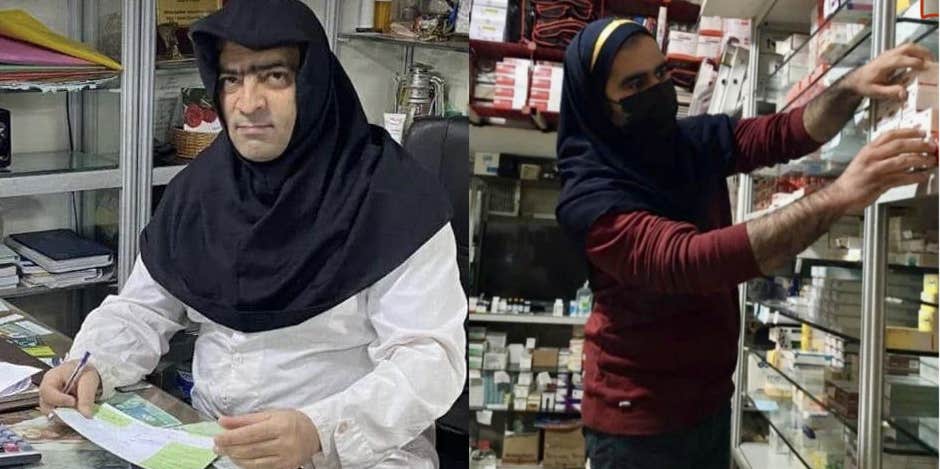Men Wear Hijabs In Iranian Pharmacy In Solidarity After New Rule Mandates All Women Cover Up While At Work
They're showing their support
 Twitter
Twitter In a new wave of regulations following protests over Iran’s mandatory hijab law, the country’s Food & Drug Administration has ordered pharmacies to force their female employees to wear the traditional black veil in the workplace.
Across the nation, people have been protesting following the September 2022 death of Mahsa Amini. And it looks like the backlash over the repressive law isn't slowing down.
Iran’s FDA operates under the guidance of the country’s ministry of health and has reportedly shut down two pharmacies due to noncompliance with the mandate. However, many Iranians are not backing down against the patriarchal regime.
Men in Iranian pharmacies have donned hijabs to join in solidarity and protest against the policy.
An Iranian journalist and activist, Masih Alinejad, posted images on Twitter showing male pharmacy employees “mocking” the government’s order by wearing the veil. Alinejad explains that men like these can help the movement succeed.
“Iranian men are mocking this order and supporting their female colleagues by wearing hijab,” Alinejad wrote. “Compulsory hijab is the main pillar of a religious relationship. Together we will bring this wall down.”
Alinejad doesn’t stop there but goes on to call on pharmacists outside of Iran to join in solidarity. She explains that noncompliance with the order puts many women’s jobs at risk.
“I call on international pharmacists to support their Iranian colleagues. Many women lost their job for the crime of resisting compulsory hijab laws,” Alinejad wrote. “Forcing women to wear hijab is an insult to all women and men across the globe. Human rights is a global matter. Show your solidarity.”
Many people applauded the men’s actions, supporting Alinejad’s belief in the necessity of solidarity.
“‘He for She’ is the only way women can win,” one person wrote. “Womens rights are not for women, but for everyone. Kudos to these brave men.”
“Our men here are some real life heros! We are so proud of these well-educated honorable men fighting for justice right alongside us, women,” another person added.
Feminists in Iran have been fighting for this important issue for decades. But this new wave of protests has the world looking.
So, what started the Mahsa Amini protests?
On September 16, 2022, a 22-year-old Kurdish woman, Mahsa Amini, died in suspicious circumstances after being arrested by Iran’s “morality” police for disobeying the hijab mandate.
People at the scene claimed they witnessed police beating Amini. She was in a coma for three days before succumbing to her injuries.
Her death sparked many in the capital of Tehran and western Iran to protest the government and its mandate, which has been in effect since 1983 following the 1979 Islamic Revolution that overthrew Iran’s monarchy.
The new pharmacy ruling came with several crackdowns from the government. The Islamic Republic News Agency, IRNA, reported that Iran’s Chief Justice Gholamhossein Mohseni Ejei said the government would punish women not wearing a hijab.
“Removing one’s hijab is equivalent to showing enmity to the Islamic Republic and its values. People who engage in such an abnormal act will be punished,” Ejei said.
The pharmacy policy forces managers to ensure that their female employees are compliant. In addition, it requires them to post instructions on the hijab mandate in their establishment within view of customers.
The news publication Iran International reported the two pharmacies that the state “sealed off” due to female employees not complying with the hijab order are in the cities of Tehran and Amol, respectively.
Radio Free Europe/Radio Liberty reported that the Amol pharmacy’s owner, Dr. Forough Haghpanah, refused to wear a hijab after a cleric confronted her. The cleric recorded the interaction on his phone, which has since gone viral.
RELATED: Video Shows Iranian Men Defending Woman Who Was Slapped By Stranger During Women’s Rights Protests
On top of denying his request to wear a hijab, her staff also refused to provide him with any services. Her dissent led the chief justice of Amol’s province to shut down the pharmacy “for failing to comply with the hijab law and for not providing services to a customer.”
Despite the law being in effect for decades, women before the protests could more easily circumvent it. The new governmental enforcement following the protests has made it increasingly difficult without repercussions.
Knowing how to support an issue that is so large and far away can sometimes feel daunting. However, people worldwide can provide valuable aid from the comfort of their homes.
An article from Time gives places to donate, petitions to sign, and other resources to help in the Iranian fight for freedom.
RELATED: How To Help Save Two Iranian Women Facing Execution Over Their Activism
Ethan Cotler is a writer living in Boston. He writes on entertainment and news.
